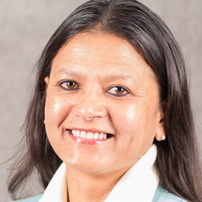
Mymoena Ismail
CEO, National Electronic Media Institute Of South Africa
South Africa
Mymoena Ismail is a South African best known for her work in the area of ICTs and societal development. Ms Ismail is the CEO of the National Electronic Media Institute of South Africa (NEMISA), a national public entity of the Ministry Telecommunications & Postal Services. Ismail received many accolades for her work, which was aimed at ICT and the development of South Africa and have co-authored many papers on the subject. She is the daughter of local South African businessman Abubakr and Maryam Ismail. She graduated from the University of Cape Town and earned her master’s degree from University of the Western Cape. She has along history with developing e-skills human capacity in South Africa. From 2010, she was Chief Director at the then-named Department of Communications’ e-Skills Institute. The work of the e-Skills Institute resulted in the concept launch of the Ikamva National e-Skills Institute (INeSI) in February 2014. This is the first national catalytic organisation in South Africa. The model was endorsed by the ITU (United Nation’s International Telecommunications Union) and recommended to 55 countries. The iNeSI Bill was recently approved by the South African Government and is seen as one of the major contributors to drive the country digital industrial revolution. NEMISA moving towards INeSI is responsible for the development of e-skills human capacity in South Africa. The distributed model was designed to impact against the National Development Plan, SA Connect and Outcome 5 of the Medium-Term Strategic Framework (MTSF). Ismail’s work included a leadership role for:
The establishment and delivery of a national approach (across Government, Business, Education, Civil Society) to develop South Africa’s e-skills, e-readiness & e-astuteness capacity to deliver more equitable prosperity and global competitiveness;
Providing the credible leadership required to develop a Departmental organizational architecture that can deliver a multi-departmental (including State Owned Companies) approach to addressing an issue of high national importance in capacitating South Africa to advance a developmental agenda; Providing the coordinated leadership to deliver the second National e-Skills Summit in conjunction with the International Telecommunications Union’s Global ICT Forum on Human Capital Development which resulted in delivery of the second National e-Skills Plan of Action (NeSPA – 2013); Providing the leadership for and managing the establishment and sustainable development of six provincial collaborative e-skills knowledge production and coordination CoLabs across the country in association with higher education institutions to establish a delivery structure for an integrated, coordinated and locally driven (vertical and horizontal) approach to capacitate an inclusive developmental state;
Providing the coordinating leadership for managing the establishment of a national Research Network for e-skills (ResNes);
Establishing and leading a credible alignment and engagement with relevant international bodies at the planning and delivery levels – UNDP, UNESCO, World Bank, UNCTAD, CISCO, Apple, Blackberry, ITU and to formalize these through Memoranda of Understanding; Providing the leadership for and managing the policy change agenda for addressing e-readiness across key stakeholders i.e. government, academia, business and civil society (national and international); Coordinated the delivery of international visitations for e-Skills delegations of South African Government, University, Business and Civil Society leaders to USA (Silicon Valley) Mexico (Tech de Monterrey), Ireland, United Kingdom, Kenya, Rwanda, Australia and New Zealand and the subsequent analysis and distillation of experiences into the strategic and operational plans of the e-Skills Institute; Providing the leadership and management to establish a multi-stakeholder collaboration with the national curriculum development and training working group in developing a number of short courses, undergraduate and post graduate and open and distance courses relevant to e-skills needs within the context of a developmental state – delivery of National Curriculum and Competency Framework policy document (NCCF); Influencing universities, TVETs, training agency intakes in relevant e-skills aligned to and accepted by industry, government and educational needs; Providing leadership to enable the realignment of e-skills efforts in South Africa so that there is clearly defined alignment to “impact” within the context of the National Development Plan (NDP-2030) Medium Term Strategic Framework and the Millennium Development Goals;
Providing the leadership to position South Africa as a continental leader in e-skills development for strategic impact in the context of a developmental state; and Establishing an effective means to communicate achievements and build increasing collaboration with stakeholders across Government, Business, Education, Civil Society (nationally and internationally) as well as with higher levels of government decision-making. Ismail’s impact has been recognized repeatedly. In 2016 she was awarded the Women in ICT and ICT Public Service Contributor of the Year in her country.